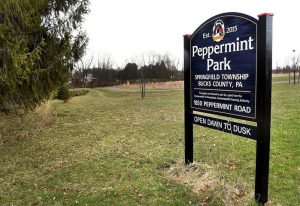
![]()
Owners of several dogs that have died of cancer or lymphoma in Springfield in recent months are blaming the use of chemical herbicides by a hay farmer for their dogs’ death — and they’re asking the township to put a stop to it.
The township dedicated about 5 acres of land as Peppermint Park at 1040 Peppermint Road in 2016. Farmer Anthony Renner farms hay adjacent to the park, on about 35 acres on the same township-owned tax parcel through a dual-use lease with the township, Township Manager Mike Brown said.
The use of chemical herbicides 2,4-dichlorophenoxyacetic acid (2,4-D) and 3,6-dichloro-2-methoxybenzoic acid (Dicamba) on the fields has been the subject of debate at least since 2016, when a resident petitioned supervisors to ban the use of chemical herbicides on the fields. The township’s own Environmental Advisory Council submitted a report and opinion to township supervisors that same year recommending officials prohibit the use of the herbicides.
The report specifically recommended either allowing only “organic methods” to farm hay after the current lease has expired, or let the area be “returned to native meadow and only mowed once per year.”
This news organization was unsuccessful in contacting Renner, but Brown said the farmer uses the herbicide to kill poison ivy and prevent it from spreading and contaminating his crop. The National Pesticide Information Center, a joint venture between Oregon State University and the federal Environmental Protection Agency, states 2,4-D kills broadleaf weeds by “changing the way certain cells grow.”
Dog owners spoke out at a recent township meeting about the chemical use, and Brown confirmed Wednesday that township supervisors will further discuss those concerns at a meeting on April 10.
David Bretz, who lives about a half-mile from the park, has lost two greater Swiss mountain dogs since January to canine lymphoma, which he believes is related to the use of two chemical herbicides on the leased area of the property.
Bretz said he began investigating the herbicide in 2016 after a notification from the township that the park was closed due to herbicide application. He said the more he researched, the more he grew concerned over the potential health impacts to his three greater Swiss mountain dogs; Dimples, Prudence and Zepplin.
Bretz said he found multiple reports that claimed the herbicide — which was once an ingredient in the now-banned Agent Orange — might cause canine lymphoma. [emphasis added]
On Jan. 26, Bretz’s 6-year-old dog Prudence died of lymphoma, following a diagnosis weeks earlier. His 10-year-old dog Dimple died of lymphoma on Feb. 23.
“Zeppelin (his youngest dog) is still with us and being monitored closely,” Bretz said in an email.
Bretz said he’s not the only resident living near or frequenting the park to lose a pet to cancer, stating that multiple residents attended a recent March meeting speaking out against the use 2,4-D near the park.
The township has owned the land since 2002, and when it was dedicated as a park 14 years later, a portion of the park was leased for hay farming.
The current hay farming lease with Renner and his stepfather, Jerry McCurdy, is set to expire in 2020, and the township amended the agreement in February 2017 requiring a 30-day notice before applying the herbicide and closing the park to the public for up to three days.


Almost a year later and following recent complaints from Bretz and other residents, supervisors agreed to extend the park closure time to two weeks after herbicide application.
In its 2016 report, the township’s environmental council said it considers Dicamba as “very similar in action and toxicity to 2,4-D” and asserts similar negative affects are found in both pesticides.
In 1991, the New York Times reported studies found an association between 2,4-D use and higher cancer rates in dogs, and the Journal of the American Medical Association published a report in 1986 showing an association between exposure to herbicides like 2,4-D and non-Hodgkin’s lymphoma in humans.
The EPA has not officially labeled 2,4-D as a carcinogen, and multiple industry reports refute cancer claims in previous studies as misleading.
A veterinary oncologist with the Center for Animal Referral and Emergency Services in Middletown said proving a direct link between Bretz’s dogs’ lymphoma cases and 2,4-D use is difficult, at the very least.
Responding to this news organization’s general questions about the herbicide’s use and canine lymphoma, Dr. Beth Overley-Adamson said past studies show an association between 2,4-D use and canine lymphoma, “but association is not causality, and causality can be very hard to prove.”
“There can be no certainty in my opinion, because cancer is a complex and multi-factorial disease,” Overley-Adamson said in an email, adding that genetics, lifestyle and environmental risks all can contribute to cancer in humans and dogs.
Lymphoma is the most common hematopoietic cancers in dogs and occurs in about 14 to 100 cases per 100,000 dogs annually, Overley-Adamson said.
Overley-Adamson added that meeting a scientific standard for a certainty on anything can take decades, but does not mean people should assume safety until proven otherwise.
“We suspected that smoking caused cancer in the 1920s, but it took decades and many, many lives to prove it beyond anyone’s doubt,” she said.
Bretz wants the farming to stop altogether, citing frustration with the township for doing “bare-bones minimum” to notify residents and calling the use of the herbicides on the same land as a public park irresponsible.
“It’s (the township administration’s) ignorance, arrogance and negligence time and time again on this matter that has created the current sad situation us residents find ourselves in,” Bretz said.








